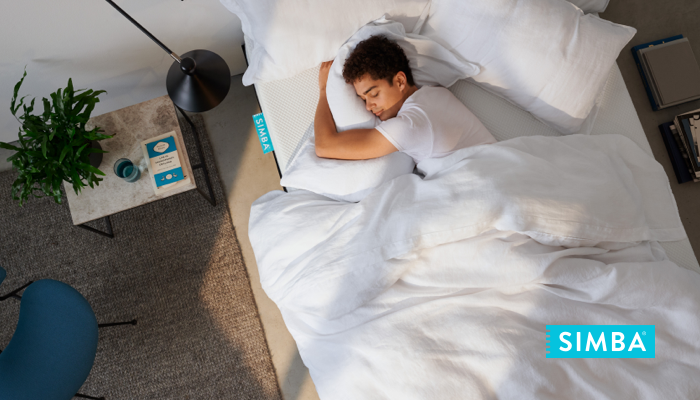Losing sleep due to stress? You’re not alone.
A recent worldwide survey revealed that less than half of people surveyed agreed that they got enough sleep. While there are many reasons as to why we’re finding it harder to nod off, including the impact of technology stress seems to be a commonly reported factor that links with lack of sleep. In fact, a 2015 survey revealed that 33% of Britons reported stress as the most common mental health issue they experienced, followed by anxiety at 29%.
As we lie in bed at night, worrying about things that have happened during the day, or feeling anxious about what tomorrow might hold, it is unsurprising that this not only affects our ability to fall asleep, but also influences the quality of sleep we’re getting. Eventually this becomes a vicious cycle, as poor sleep causes our stress levels to skyrocket, leaving us more frazzled and nervous than ever before.
Discover more about how stress impacts sleep, and how to overcome the symptoms for a more restful snooze.
The Link Between Chronic Stress and Sleep Disorders
We’ve all felt stressed at some point in our lives. It’s common for us to obsess about something that has upset us earlier that day, worry about issues with work or feel overwhelmed by a big or difficult life event.
However, when these feelings go unresolved for a long time, we reach a point of chronic stress that quite literally results in us ‘losing sleep’. Many psychologists have speculated that there is a link between stress and the condition insomnia, in which people struggle to sleep or stay asleep on a regular basis, leading to unhealthy sleep patterns and ongoing fatigue.
When we experience elevated stress levels, we struggle to relax due to various physical and mental symptoms. This might include a racing pulse and tense muscles as well as an anxious busy mind; all of which make it impossible to nod off.
We may also find that our sleep cycles become more disturbed and restless. Sleep disorders such as sleepwalking, sleep-talking, bruxism (tooth grinding) and waking during the night have also been linked to stress and cause further sleeplessness for those sharing a bed.
Poor Sleep Triggers Your Stress Hormones
When we’re stressed or worried, our body produces a hormone called cortisol which is released when we perceive a threat or danger. After a poor night’s sleep, our body boosts the levels of this stress hormone to help us stay awake.
Studies have also shown that deep sleep is a restorative stage of our natural sleep cycle and that after a poor night’s sleep, our body fails to repair itself. This leads to high levels of cortisol and ‘short circuits’ within the brain, causing an inability to react, problem-solve or concentrate in our waking life. Of course, this leaves us feeling even more stressed the next day.
Lack Of Sleep Leads To More Stress
There is a lot of evidence outlining the cycle of stress and sleep deprivation.
A survey in 2015 identified the top five causes of stress in the UK population, and shockingly 22% said that ‘not getting enough sleep’ was one of the major causes of stress.
As the lack of sleep leaves us feeling more lethargic and less productive, it becomes more difficult to focus at work and home, causing even more stress over our careers and relationships. Eventually, prolonged sleep deprivation can take its toll on our health, leading to physical risks of high blood pressure and weakened immune system as well as mental health conditions such as depression.
How To Overcome Stress For A Good Night’s Sleep
While stress will not go away overnight, there are a number of ways you can better manage your stress and sleeping habits, particularly when winding down on an evening.
Creating a comfortable, ‘stress-free’ environment with low lighting and minimal noise will allow you to settle down in solitude before bed.
Why not consider investing in bedding that is designed to fit you and your needs to make bedtime a more enjoyable experience? The Simba Hybrid® Mattress is one of the most innovative mattresses available as it’s long lasting and cost-effective with a 10-year guarantee, ensuring that you can drift off more comfortably and get the good night’s sleep you’ve been dreaming of.
You should also choose a calming activity you enjoy before bed such as a hot bath or reading, that will help you focus on something other than your worries, while allowing you to unwind./p>
It’s also recommended to avoid using electronics at least 30 minutes to an hour before you go bed, and refrain from sugary snacks or caffeinated drinks in the evening to help you slip into an effortless slumber.
Exercising during the day can also help get rid of excessive nervous energy, leaving you feeling more tired and ready to hit the hay. Meditation is also said to be a useful tool as it allows you to focus on your breathing, which has an overall calming effect on your body.
If you have trouble sleeping, follow some of our expert sleep hygiene tips at Simba.com. Remember that a combination of prolonged stress and poor sleep can cause serious health issues, and should be discussed with a qualified health professional if symptoms persist.

